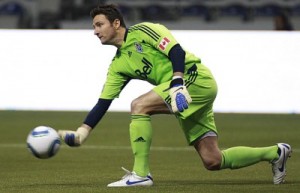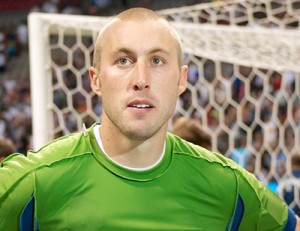 Professional sport can be a cruel business. The Whitecaps have been rolling recently. They’ve lost only one of their last twelve games — winning five of their last six — and a big part of that streak has been the play of goalkeeper Brad Knighton. Yet despite that stellar recent play — two clean sheets in the last four games, another that slipped away on the last kick of the game and an MLS Player of the Week award — Knighton is in very real danger of losing his starting job to incoming Danish goalkeeper David Ousted. It might not be fair, on recent form, but will it make Vancouver a better team? Read on after the jump to find out.
Professional sport can be a cruel business. The Whitecaps have been rolling recently. They’ve lost only one of their last twelve games — winning five of their last six — and a big part of that streak has been the play of goalkeeper Brad Knighton. Yet despite that stellar recent play — two clean sheets in the last four games, another that slipped away on the last kick of the game and an MLS Player of the Week award — Knighton is in very real danger of losing his starting job to incoming Danish goalkeeper David Ousted. It might not be fair, on recent form, but will it make Vancouver a better team? Read on after the jump to find out.

When Joe Cannon got the nod for the season opener against Toronto, it raised many eyebrows. The 38-year-old certainly wasn’t looked upon as a big downgrade, but most had thought Knighton would carry on from last year as the number one. Cannon played well in the early part of the season, but looked timid when coming off his line. With a back line that’s solid and positionally sound but not particularly good in the air, teams soon started firing cross after cross into the Whitecaps box, and the result was often a scramble that had fans holding their breath. Cannon also has an annoying habit of punting the ball out of bounds around midfield. Certainly few, if any, of the poor results the Caps had in the early going could be laid outright at Cannon’s feet, but fans were starting to get a bit twitchy, and everyone felt it was time to see what Knighton could do.

When the finals of the Voyageurs’ Cup came around, Knighton got his shot. He’d already started the semi-finals, of course, but wasn’t tested all that much against FC Edmonton. When Vancouver went into Montreal and secured a 0-0 draw, looking much more stable on crosses into the box, the starting job was his. Has he done better? We’ll look at that in a minute. Certainly the team has been much improved. With Joe Cannon in goal, Vancouver went 3W-3D-4L, good for 1.3 points per game, and were sitting near the bottom of the tough Western Conference. Since Knighton took the reins, the team is 6W-2D-1L, for 2.2 points per game. He also went undefeated in four Voyageurs’ Cup games, only losing the finals on away goals. Much of that success, though, has to be attributed to the team’s recent offensive outburst. Cannon didn’t get a lot of run support, with the Caps averaging only 1.2 goals per game with him in net. Knighton benefited from 2.0 GPG.
In terms of shot-stopping, there’s not much to separate Knighton and Cannon. Both rank in the top 8 in save percentage*, the slight edge going to Cannon at 74% to Knighton’s 72%. The shots per game tally is also pretty close, with Cannon facing 4.5 shots per game to Knighton’s 4.2.
(* Goalies with more than 5 games played.)

Things get interesting when you look at distribution. Cannon has a reputation as a poor distributor of the ball. His drop kicks into the lower rows of the purple sections are often mocked, yet a quick look at the numbers shows that Cannon has turned the ball over much less than Knighton. In his 10-game stint, Cannon completed 156 out of 268 passes, good for 58.2% accuracy. In Knighton’s 11 games against MLS opponents he’s completed only 154 passes out of 353, for just 43.6%. By comparison, the goalkeepers of Whitecaps opponents this season have averaged 60.5% pass completion. I haven’t calculated the league average for goalkeepers, because the MLS website doesn’t have a handy way of doing so, but it appears Knighton at least is significantly below average in the distribution department despite a reputation to the contrary. It should be noted here that Knighton has made up for some of those turnovers with two assists in the last two games, but it’s very hard to tell how repeatable that is.
To sum up: Cannon stopped a higher percentage of shots, faced roughly the same number of shots per game and distributed considerably more accurately than Knighton, but lost his job because of a string of sub-par results where Vancouver’s forwards couldn’t hit the ocean from a boat. The team then went on a tear with Knighton arguably just along for the ride. After Knighton’s initial clean sheet in Montreal, he allowed 2 goals per game over the next six, and only in the last couple of weeks has he really looked like a top-tier MLS keeper.

So where does Martin Rennie go from here? David Ousted was presumably not brought in to be the backup goalie. Vancouver currently has three keepers on the books that have recently been number ones on their respective teams. There have been whispers that Cannon might be looking at retirement, especially given that he didn’t make the game-day roster against Chicago and was spotted back east last week instead of training with the team.
If retirement isn’t in the cards, Vancouver could look at selling high on Knighton after his two recent good outings. Cannon is holding his own, but no longer looks like he can deal with crosses effectively. Knighton is much more aggressive, but he gives the ball away too much. Both would make excellent backups, if they’re willing to play that role. Ousted, by all reports, is strong in all three areas: shot-stopping, distribution and command of the box. Despite recent strong performances by Knighton, next weekend’s game against the Los Angeles Galaxy could very well be his last start as the Whitecaps’ number-one keeper.
